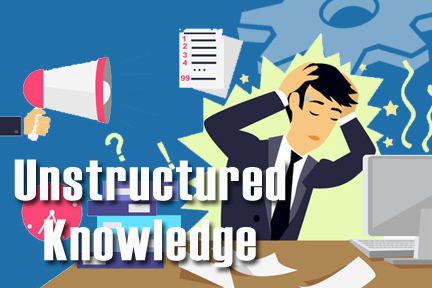 “Unstructured knowledge is the challenge of our time!” So said an article by Ricoh Americas Corp. I can’t help but agree! I have been shouting this from the roof-top for some time now.
“Unstructured knowledge is the challenge of our time!” So said an article by Ricoh Americas Corp. I can’t help but agree! I have been shouting this from the roof-top for some time now.
As a result, I wrote a book and numerous articles about how to SOLVE the problem of unstructured knowledge; knowledge without a plan or design.
The term I’ve been using to define “unstructured knowledge” is CHAOS, caused by a lack of simple, common sense operational systems.
The key word is unstructured, meaning: Lacking a definite structure or organization; not formally organized or systematized.
Unstructured Knowledge equates to CHAOS
We see and work with many organizations disorganized and unstructured in our field of work.
Ricoh predicts that certain untapped assets (unstructured knowledge) will be a key factor for companies in the next five years and beyond—that they “consist largely of conversations, communications, unsearchable documents, processes, practices, strategies and cultural norms.” Ricoh says, “Organizations are generally unable to harness these assets today!”
Many organizations have:
1. NO written Standard Operation Procedures, organized into an up-to-date Operations Manual.
2. NO apparatus—i.e. Corrective Action System to identify and track root causes for non-conformance, nor to measure the waste in time and dollars.
3. NO user-friendly, easily-accessible system that gives employees the tools they need, to do their job without constant supervision by management.
4. NO continual improvement system to harness what Ricoh describes as “unstructured knowledge.”
Baby Boomers Retiring Taking Knowledge With Them
The Ricoh article shares that, “Baby Boomers” are retiring, and their business knowledge is leaving with them! Organizations that fail to capture this knowledge while it’s available to them, risk having customers leave to find more nimble companies with which to do business.
One of my more recent blogs addresses the loss of knowledge when a key employee leaves an organization. You may want to read that article also…When Systems Walk Out the Door.
I suggest you begin TODAY, building an Operation Manual for your organization. Start by downloading out of your head, and the heads of your key employees—all the information on how your business operates. Input that knowledge into written documents i.e. Procedures, Policies, Control Checklists, Daily Routine Checklists, Job Descriptions, etc. BEFORE your best sources of knowledge walk out the door.
Or call us… we built the systems to help you do just that!
Did I mention? Great Systems Work!

Recent Comments